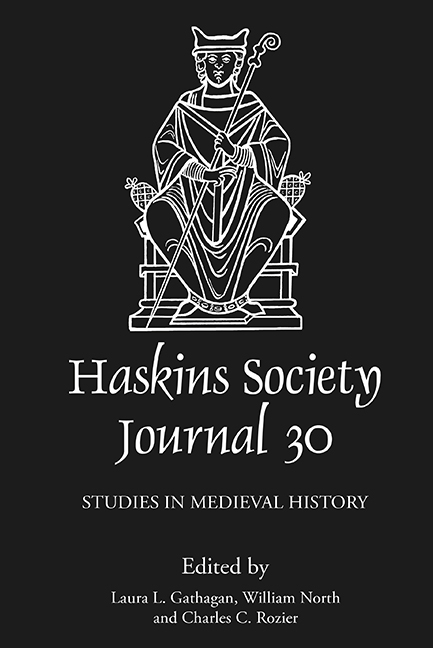Book contents
- Frontmatter
- Contents
- List of Figures and Tables
- Editor's Note
- Abbreviations
- 1 Beyond Corfe: Ælfthryth's Roles as Queen, Villain, and Former Sister-in-law
- 2 Medieval Curses and Their Users
- 3 ‘Although He Was His Nephew’: A Study of Younger Hautevilles Either Side of the Sea
- 4 Nearly Gold and Nearly Perfect? Copper, Meaning, and Materiality in Norman Sicily
- 5 Bound by Loyalty: Conflict, Communication and Group Solidarity in Early Twelfth-Century Southern Italy
- 6 Hugh of Lincoln and Adam of Eynsham: Angevin Kingship Reconsidered
- 7 Earthly Kings, Heavenly Jerusalem: Ralph Niger's Political Exegesis and the Third Crusade
- 8 ‘Holy Christendom's New Colony’: The Extraction of Sacred Matter and the Colonial Status of the Latin Kingdom of Jerusalem
- 9 Medieval French Peasants: The New Frontier?
2 - Medieval Curses and Their Users
Published online by Cambridge University Press: 30 April 2020
- Frontmatter
- Contents
- List of Figures and Tables
- Editor's Note
- Abbreviations
- 1 Beyond Corfe: Ælfthryth's Roles as Queen, Villain, and Former Sister-in-law
- 2 Medieval Curses and Their Users
- 3 ‘Although He Was His Nephew’: A Study of Younger Hautevilles Either Side of the Sea
- 4 Nearly Gold and Nearly Perfect? Copper, Meaning, and Materiality in Norman Sicily
- 5 Bound by Loyalty: Conflict, Communication and Group Solidarity in Early Twelfth-Century Southern Italy
- 6 Hugh of Lincoln and Adam of Eynsham: Angevin Kingship Reconsidered
- 7 Earthly Kings, Heavenly Jerusalem: Ralph Niger's Political Exegesis and the Third Crusade
- 8 ‘Holy Christendom's New Colony’: The Extraction of Sacred Matter and the Colonial Status of the Latin Kingdom of Jerusalem
- 9 Medieval French Peasants: The New Frontier?
Summary
On 6 July 900 twelve bishops from across northern France met in Rheims cathedral for the ordination of the new archbishop, Heriveus (900–22). His consecration followed the murder of the previous incumbent, Fulk (882–900), some nineteen days earlier. Fulk's death was a consequence of a complex and ongoing dispute between the archbishop and Baldwin, count of Flanders, for control of the important monastery of Saint-Vaast in Arras. The assembled bishops used that occasion to proclaim the excommunication of Fulk's assassins, named as Winemar, Everard and Ratrid, along with their accomplices. The words of the formula they used begin:
In the name of the Lord and by virtue of the Holy Spirit, as well as by the authority divinely bestowed on bishops by blessed Peter, foremost of the apostles, we separate these [men] from the bosom of Holy Mother Church, and we condemn them with the anathema of a perpetual curse, so that their recovery cannot ever be effected by man, nor may they have any communication with Christians.
It continues with a set of very specific maledictions taken from Deuteronomy: they should be cursed in the city and in the field, in their barn and in their stores, in the fruit of their womb and of their lands, in the herds of their oxen and flocks of their sheep, in their entering and leaving. To these was added the injunction that, sharing the fate of the faithless and unfortunate Arius, their intestines should be poured down a privy. It spells out the condition of their sentence; they are to be cut off from all contact with other Christians and from all Christian services, especially those of the last rites and Christian burial:
Therefore may no Christian say Ave to them. Unless they come to their senses, may no priest presume ever to celebrate masses, nor, if they are sick, to receive their confessions, nor ever to give them holy communion, even at the end of their life but ‘let them be buried in an ass's grave’ (Jeremiah 22.19) and let them be above the face of the earth on a dung-heap so that they are an example of disgrace and cursing to present and future generations.
- Type
- Chapter
- Information
- The Haskins Society Journal 302018. Studies in Medieval History, pp. 21 - 52Publisher: Boydell & BrewerPrint publication year: 2020

